Are you a researcher? Do you work in a research organisation, project or program? Are you looking for ways to better conduct your research for development, share knowledge, engage with stakeholders, and achieve impact?
To help answer those questions, visit ‘Improving impact through knowledge sharing in research‘ the newest context page to be recently added to the Knowledge Sharing Toolkit. The new page offers people ideas, experiences and inspiration on recommended tools and methods to share knowledge during the research project cycle.
The Knowledge Sharing toolkit has consistently provided lots of information on tools and methods for knowledge sharing. However, it has been striving to make this information more relevant and accessible to people’s needs and situations.
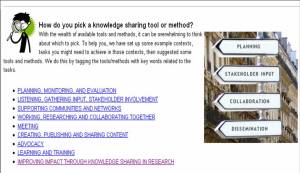
To help its visitors even better find what they are looking for or figure out what they may need and could use- a ‘What is your context?’ page was also developed.
The new context page on knowledge sharing in research-‘Improving impact through knowledge sharing in research‘- takes people right into the research process with a basic diagram of the research cycle and its key stages.
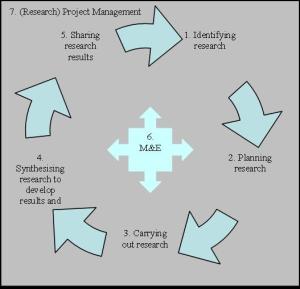
These stages are presented as ‘entry points’ through which knowledge sharing approaches can be made use of to address certain shortcomings and limitations which traditional research may experience such as:
- a lack of inclusion of priorities, needs and realities from the ground
- inadequate use of other sources of knowledge in planning research
- poor collaboration with stakeholders during research activities
- limited understanding of how research results can most effectively be made use of
- ineffective ways of getting knowledge to target groups
- limited opportunities for learning within research process
To address these, the context page invites visitors to consider which stage of research they are in- and asking a key question related to improving that stage. The page then provides a list of suggested methods- both Online tools and Methods as well as Other Knowledge sharing Tools and Methods- to try out. These tools and methods are linked to other pages within the toolkit. Tags of related topics are also provided.
Example:
Stage 1: Identifying research (questions) to undertake
- How can we share knowledge, methods, experiences and ideas to help identify research questions or concepts which are necessary and will provide knowledge and solutions which will have an impact?
Online Tools and Methods: Online Collaboration Platforms, Online Surveys, Wikis, Blogs, RSS, Discussion Forums
Other Knowledge Sharing Tools and Methods: Impact Pathway approach, Outcome Mapping, Learning Alliances, Visioning
Tags: relationship, collaboration, inclusion, prioritization, knowledge sharing, demand
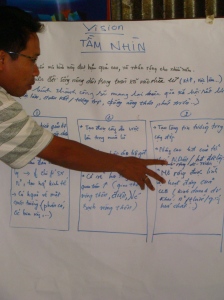
This information has come out of the resources collected, knowledge generated and experiences of the recently concluded two-year CGIAR ICT-KM Program’s Knowledge Sharing in Research project (2007-2009). The framework on which this context page is based was developed and tested particularly through 6 Pilot Projects.
These Pilot Projects are all projects of CGIAR Centres or System-wide or Challenge Programs which proposed to pilot the use of various knowledge sharing approaches and principles in their activities. This included: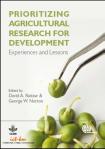
- The facilitation of sharing of methods and experiences for research prioritisation assessment which was developed into a book-lead by a CIFOR scientist

- The convening of a Farmers’ Conference to bring out the knowledge, experiences and needs of farmers to help in planning of activities of the Participatory Plant Breeding department at ICARDA
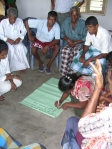
- The use of a learning alliance approach by the IWMI WASPA project to bring together relevant stakeholders to link research to action
- Another IWMI Pilot Project-working across a number of wastewater projects, made use of World Cafes, radio programs, and flip charts to figure out with target
 stakeholders what messages would work to promote adoption of better practices in wastewater irrigation
stakeholders what messages would work to promote adoption of better practices in wastewater irrigation
- The IRRI-lead Pilot Project worked with key stakeholders to
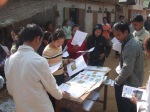 understand how to write and package research results from projects working on rice in the Northern uplands of Laos, and created factsheets which were uploaded into the Laos Rice Knowledge Bank (online tool)
understand how to write and package research results from projects working on rice in the Northern uplands of Laos, and created factsheets which were uploaded into the Laos Rice Knowledge Bank (online tool)
- The use of outcome mapping and most significant change approaches
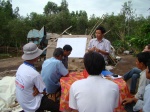 to increase the knowledge sharing and learning together with stakeholders as part of monitoring and evaluation activities by a fish culture project of WorldFish
to increase the knowledge sharing and learning together with stakeholders as part of monitoring and evaluation activities by a fish culture project of WorldFish
The selection of tools for each of the stages of the research cycle is based on the results and experiences of these 6 Pilot Projects as well as other projects and other documented cases. Documentation of the Knowledge Sharing in Research project, its pilot projects and other activities can be found on the Documentation and Outputs page of the KSinR website section.
But this is not a blue print approach and each research project needs to find what fits with its own context, needs and objectives–the tools presented in this context page are just some suggestions to help.
If you have also used knowledge sharing approaches in your research let us know what you have done and how it worked. If you try any of these suggested approaches out, also let us know how it worked. You make contributions to the Knowledge Sharing Toolkit to keep it a living and dynamic resource by signing up and adding your methods, ideas and experiences.
 We are currently launching a new version of the KS toolkit. Developped as a wiki, it has expanded to a huge amount of tools and methods.
We are currently launching a new version of the KS toolkit. Developped as a wiki, it has expanded to a huge amount of tools and methods.